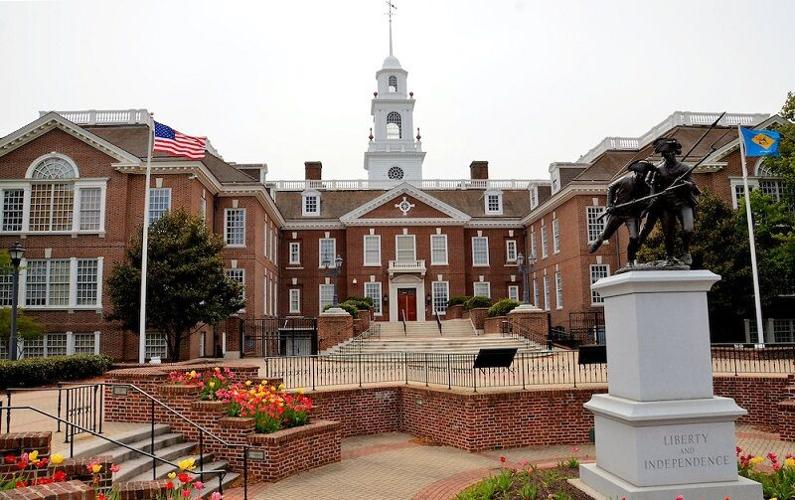DOVER, Del. - As the 152nd General Assembly came to a close on June 30, action was taken on nearly 50 pieces of legislation. Changes in gun control, healthcare, education, the environment and more are now pending Gov. John Carney's signature. Here's a look at what passed and what to expect in the future.
LEGISLATION THAT PASSED
Gun control
Permit to purchase, or Senate Substitute 1 for Senate Bill 2, was signed by Gov. John Carney on May 16. Over 25 amendments were proposed for the bill this spring, most of which were defeated. The permit to purchase bill does exactly what it sounds like; it requires a handgun purchaser permit in order to buy handguns. In order to obtain a permit, one must:
- Be at least 21.
- Complete a firearms training course that includes safe storage, shooting and handling practices as well as techniques for managing violent confrontations.
- Submit an application to the State Bureau of Identification, including fingerprints and a background check.
Permits are valid for two years from the date of issuance. The bill received a great deal of attention, both from those in favor and those opposed. The day after it was signed, a suit was filed in U.S. District court that claims the new law is unconstitutional.
Environment and development
Senate Bill 265, which allows the State Energy Office to request bids to procure wind energy offshore of Delaware, was one of nearly 50 pieces of legislation passed by the General Assembly on June 30, the last day of this session. Municipal utilities as well as rural electric cooperatives and third party purchasers are able to participate in the bid process. Projects can be for Delaware alone or in coordination with other states. Solicitations for wind energy projects can be drafted if the energy office believes a bid will not go over 110 percent of the average price Delmarva Power has paid for power and renewable energy compliance over the prior three years.
"The expansion of sustainable clean-energy solutions is critically important to the fight against climate change, and offshore wind is an important tool as we work to build a cleaner, greener future for Delaware," said Lori Brennan, executive director of The Nature Conservancy in Delaware and Pennsylvania, in a statement shortly following the bill's passing.
Senate Bill 265 was passed along party lines with most Democrats in favor and Republicans opposed. This bill awaits Carney's signature, after which it will take effect.
A bill that addresses development also passed. Senate Bill 274 encourages the development of affordable housing by providing financial incentives to developers. Residential subdivisions classified as Level 1 and Level 2 projects, which are those in areas already established or those with newer infrastructure and planned investments, can receive credit for off-premises improvements to state-maintained highways. The credit amount is based on the percentage of affordable housing lots in the subdivision, so if 20 percent of the lots are set aside for affordable housing, the developer gets a 20 percent credit on the cost of highway improvements.
"We are in a crisis right now, where people who work here and are from here a lot of times can't afford to live in the areas where they grew up. I know a lot of people who lived in Lewes, or grew up in the Rehoboth or Milton areas, and there's no way they can afford to build there now," said Senate Minority Whip and State Sen. Brian Pettyjohn, R-Georgetown, who sponsored the bill. "They're going farther west, sometimes over the Route 113 corridor, to be able to build a home. Honestly, that puts them away from their work, number one, but number two, it puts an additional strain on the traffic infrastructure because now, instead of having people living where they're working, they're having to travel through other towns across the county, which puts a load on a lot of roads."
Health
One of the most publicly discussed bills of this session was the hospital oversight bill. It creates the Diamond State Hospital Cost Review Board, which will be responsible for an annual review of hospital budgets and related financial information. The board will include six governor-appointed members along with the executive director of the Delaware Healthcare Association.
Hospitals must submit yearly budgets, audits and related financial information for the board to review to ensure they're in compliance with government spending benchmarks. This includes proposed budgets and salaries for a hospital's leadership. Hospitals that exceed spending benchmarks may be required to submit improvement plans and could face civil penalties up to $500,000 if they don't improve.
The Delaware Healthcare Association and other medical facilities were initially opposed to this legislation. In a May 1 email to employees, Beebe Healthcare President and CEO David Tam urged them to oppose the bill and reach out to local representatives, citing concerns that Beebe and other community hospitals would have been "especially and disproportionately impacted," and that the hospital's ability to recruit and retain physicians and nurses as well as fund services to the community could be jeopardized.
After an amendment removed the review board's ability to seize hospital assets, required at least one member from each county to have a seat on the board and revised the cost cap, the Delaware Healthcare Association took a neutral stance. Senate Republicans said on May 16 that this amendment "makes a disastrous bill less bad."
"After the amendment, the Delaware Healthcare Association went neutral on it and figured it was the best they could get at that point in time," Pettyjohn said. "I still don't think it's a good idea for the state government to be regulating our hospitals and telling the hospitals how they should spend their money. A lot of the discussion was about how hospitals have exceeded the benchmark set by the state. Well, the State of Delaware has exceeded the benchmark that was set... in our own budgets."
"I think it's a very valid concern, that they're starting to do this to hospitals now because they don't like what the hospitals are doing. Who's next?" Pettyjohn asked. "Who is the state going to try to regulate and control their board, and control their budget processes, next? I think it's a space that should be more in collaboration, more partnership with the state."
The hospital oversight bill, House Substitute 2 for House Bill 350, was signed into law by the governor on June 13.
A bill that mandates the appointment of two state retirees to the State Employee Benefits Committee came to a dramatic end on June 27. House Bill 282 was vetoed by Carney, who cited concerns about their addition to the committee.
"Unlike the state leaders who would be removed from the SEBC under this bill, even a well-intended appointee under HB 282 would have no obligation to protect and secure the State's overall fiscal health," Carney said in a statement regarding his veto on June 25. "In fact, they would have every incentive to oppose any proposal that might negatively impact their personal interests."
Legislators on both sides of the aisle voted unanimously to override the veto. Along with these two new committee members, the bill requires that the secretary of the Department of Human Resources inform state employees and retirees about certain changes in benefits coverage.
A bill that expands insurance coverage for abortion across different types of insurance, including Medicaid and private plans, was passed by the General Assembly on June 25. Coverage for pregnancy termination services will not be subject to deductibles, coinsurance or other cost-sharing up to $750 per covered individual per year, according to the bill. Federal and state funds can be used.
According to House Substitute 2 for House Bill 110, religious employers may obtain an exclusion from the health insurance carrier if the requirements conflict with the organization's religious beliefs and practices. They must then provide reasonable notice to employees of the exclusion. Exclusions for coverage for services related to abortions deemed necessary to preserve the life or health of the covered person are not authorized.
House Amendment 1 for House Bill 140, often referred to as the medical aid in dying bill, also awaits the governor's signature. This bill permits a person who is terminally ill to request and self-administer medication to end his or her own life. The bill requires two physicians or advanced practice registered nurses to agree on the person's diagnosis and prognosis, and they both must also believe the individual is able to make sound decisions and is acting voluntarily.
"I am dying of metastatic stage four breast cancer," terminally ill Millsboro resident Diane Kraus said in a statement through Compassion & Choices, an organization that advocates for patient-directed end-of-life care. Kraus worked as an occupational therapist for 35 years, 23 which were in home care and hospice. "I watched my mother die in agony from metastatic breast cancer. I urge Gov. Carney to sign this bill into law so I can avoid the intense pain I am likely to suffer from my bone and brain tumors at the end of my life, and I can die peacefully."
Education
Two bills that could impact Delaware's education system are also awaiting Carney's signature.
Senate Bill 187 ensures that educators hired after the governor's signing date will receive credit on the salary schedule for graduate degrees earned prior to becoming educators, regardless of the specific subject area of the degree. After becoming employed as a teacher, salary step credit will only be given for degrees earned in the subject area in which the teacher is employed.
Senate Bill 188 aims to create reciprocity for teaching licenses to make it easier for teachers to move between states by removing barriers to license portability. Through this bill, the Interstate Teacher Mobility Compact will be enacted. This interstate compact is a legally binding agreement among states and allows teachers to use an eligible teaching license from one compact member state to be granted an equivalent license in another compact member state. Normally, teachers often must take exams or coursework specific to one state in order to teach there, which can take a great deal of preparation time and cost hundreds of dollars in testing fees.
To be eligible, a license must require a bachelor's degree and a state-approved program, like a teacher preparation program at a college or university. It also must not be restricted, probationary, substitute or temporary.
The compact must be enacted in 10 states to become effective. It is currently active in eight and legislation to enact it is pending in 13 more.
WHAT TO WATCH FOR IN 2025
The next legislative session is set to begin Jan. 14, 2025. Between now and then, all of Delaware's state representatives will be up for election as well as nearly a dozen state senators.
Also waiting for the Senate next year is Senate Substitute 1 for Senate Bill 180, which proposes changes to the Delaware Constitution related to voting rights for felons. Under this bill, loss of the right to vote for felons would be limited to either the length of imprisonment or being pardoned, whichever is first, and it would prohibit making re-enfranchisement contingent upon monetary payment. It also removes the durational residency requirement necessary to qualify to vote in Delaware.
Senate Substitute 3 for Senate Bill 4 aims to create changes to probation and parole. If passed, it would direct the courts, Board of Parole and Bureau of Community Corrections to use the least restrictive conditions possible to achieve community supervision of those in the system. The bill also includes removing the requirement for jail time to be served concurrently from breaking probation. It is currently on the ready list for Senate consideration.
Another bill of interest is Senate Bill 330, which would crack down on unruly parents who escalate situations on school buses.





